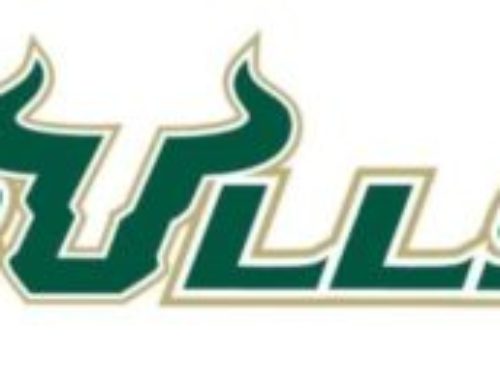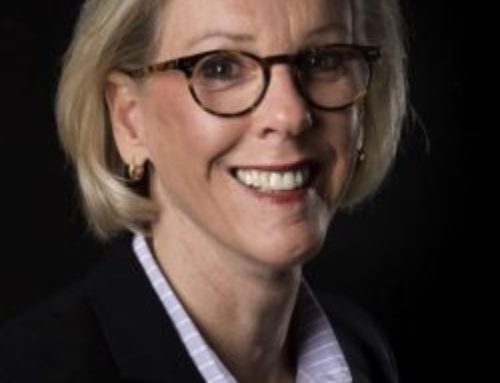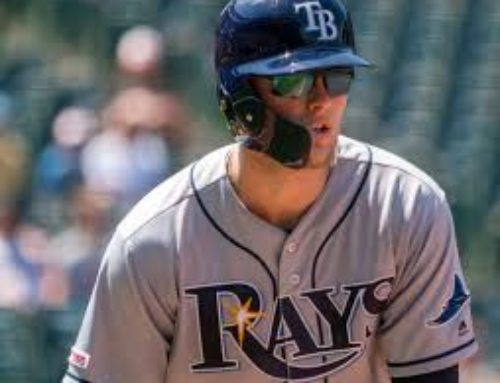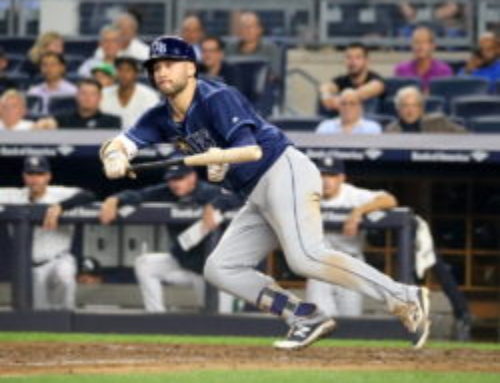By JOEY JOHNSTON
The Tampa Tribune
(c) Tampa Bay Times. Originally published Dec. 18, 1999.
Dwight Gooden soon will take his family on a Disney cruise. It’s an early Christmas present for his five kids. They’ll have a blast. Gooden? Surrounded by Mickey Mouse, Donald Duck, Goofy and Dumbo, the doting dad just wants some quiet time.
“I guess I’ll try to stay out of the way,” he said.
That’s an easy task for a 35-year-old pitcher searching for a job. In another life, such anonymity would have been impossible.
Gooden once was Doctor K, a real-world character who became famous and universally loved. Two years removed from Hillsborough High School, he unwittingly blossomed into one of the world’s most dominating and marketable athletes.
His presence could stop traffic in midtown Manhattan. Pitching for the New York Mets, he was a 19-year-old phenom, a strikeout king, a rare blend of power, finesse and poise. He owned the town. Perhaps only Mantle or Namath knew a similar sensation.
With everyone wanting a piece of him, Gooden felt safest on the mound. For those two hours, he was in control. The other stuff? That was confusing.
Endorsements tumbled in from all directions: Spalding, Nike, Polaroid, Kellogg’s Corn Flakes, even Toys R Us. “Saturday Night Live” asked Gooden to host their season-opening show. It wasn’t his style. At that point, NBC-TV fell back on its second choice: Madonna.
Gooden was a reluctant hero, even shy. He had trouble saying no – to teammates, to reporters, to anyone, really. His expression seemed to say, “Wow! How did I do that?” as he punched out batters who once were his idols.
“Back then, everybody always asked me, “Who can you compare Dwight to at a similar age?’ ” said Mel Stottlemyre, Gooden’s pitching coach with the Mets and later with the Yankees. “My answer was always the same: “Nobody.’ “
In 1984, Gooden became the youngest player ever selected for the All-Star Game. He immediately struck out the side. Howard Cosell piped up in the booth: “This kid Gooden is sensational.”
Here’s a typical story. One season later, the Mets were tied with the Dodgers 1-1 in the eighth inning. Bases loaded, nobody out, the cleanup hitter at the plate. Nobody was warming in New York’s bullpen. Why bother? Gooden needed nine pitches to escape – strikeout, popup to the catcher, strikeout. Nice and easy.
He talks of those times playfully, almost wistfully. They were a blur. Now he carries more guilt than memories, for the things he threw away, the people he hurt. Gooden tested positive for cocaine in 1987, ending his innocence. He went to rehab, stayed clean for six years, built back his reputation.
Then he slipped again.
“I can’t explain to you how powerful that stuff [cocaine] can be,” Gooden said. Powerful enough to almost destroy a career. He tested positive again. Baseball suspended him for the entire 1995 season. He thought about suicide.
Had it ended there, Gooden would have been a tragic figure. But it didn’t end there.
He picked himself up, began working out again. The Yankees took a chance on him in 1996 as a non-roster player. He made the team. And he had another incredible moment left in that right arm.
On a cool May evening at Yankee Stadium, the day before his father was to undergo open-heart surgery in Tampa, Gooden was told he could sit this one out. Everyone would understand. Gooden insisted on starting.
He threw a no-hitter.
The innings flew by. With two outs in the ninth, the Seattle Mariners still were hitless. Gooden’s 134th pitch was popped up. He triumphantly raised his arms as the ball fell into Derek Jeter’s glove.
Then the strangest sight of all. Gooden, carried off the field, shook his fists and screamed, letting loose perhaps a lifetime of emotion. He tucked the no-hit ball inside his travel bag the next morning, presenting it to his father at St. Joseph’s Hospital.
This is for you, Dad. Father and son were teary-eyed.
Sounds like a movie script, huh? Well, it almost was.
Gooden had serious talks with a production company for a film about his life, early heroics, addictions and comeback. He met with Denzel Washington in California.
“Denzel was interested,” Gooden said. “There’s a resemblance. He would’ve played me. The project kind of got put on hold. Right now, I guess it’s up in the air. It’s still a good story.”
No, it’s a great story.
It could’ve opened in June 1977, one of the first times Gooden, 12, was handed the ball. He started for Belmont Heights in the city/county Little-League playoffs. He tossed a perfect game against Progress Village, striking out 16 of 18 batters. He also hit two home runs, a double and drove in five runs during the 7-0 victory.
It would’ve continued with his junior season at Hillsborough High. He began as the team’s fifth-best starter behind Vance Lovelace, Floyd Youmans, Albert Everett and Jerry Comellas. Lovelace, a 6-foot-5 left-hander with a 95 mph fastball, made the scouts drool.
“I remember taking Vance out and all the scouts started packing up and heading for their cars,” former Hillsborough coach Billy Reed said. “Dwight came in as the reliever. Once that catcher’s mitt started popping, those scouts came on back.
“Dwight was a natural pitcher. It wasn’t my doing. His coaches in Little League put him on the right path. His control was incredible. I just made out the lineup, gave him the ball and said, “OK, Dwight, go to it.’ “
It might’ve reached a crescendo on June 7, 1982, in the sports department of the Tampa Tribune, with a wide-eyed Gooden peering into a computer terminal.
Amateur Baseball Draft
First Round
1. Chicago (NL), Shawon Dunston, SS, Brooklyn, N.Y.; 2. Toronto, Augie Schmidt, SS, University of New Orleans; 3. San Diego, Jimmy Jones, RHP, Dallas; 4. Minnesota, Bryan Oelkers, LHP, Wichita State; 5. New York (NL), Dwight Gooden, RHP, Tampa.
The script would’ve offered riveting stuff during the early years, when the “K Korner” was in business down Shea Stadium’s right-field line, when Gooden was untouchable, when a Mets’ teammate said he sincerely believed Gooden would become known as the greatest pitcher who ever lived.
“I knew it was special,” Gooden said. “But I didn’t enjoy it as much as I should’ve enjoyed it. There was so much going on. If I could do it over, I think I’d concentrate on just being myself instead of trying to please other people. But I can’t do it over.
“Sometimes I’ll put on a tape of an old game. I’ll look at my expression. It’s like I’m watching another guy. I don’t mind talking about it, although I know it’s hard to live up to those comparisons. I remember it well, but now it seems so long ago.”
Recently, Gooden was cut by the Cleveland Indians. Now he’s looking for a team, maybe even the team some five minutes from his St. Petersburg home, the Tampa Bay Devil Rays.
Some say he’s too old, at best another arm in somebody’s bullpen. Gooden says he still can start and win games. He’s healthy, working out daily, clean in body and spirit. He says he’s not done.
Maybe the final scene hasn’t been written.
Dwight Gooden: Hillsborough ’82
Highlights: At Hillsborough High, was 14-4 in two seasons. As a senior, he had 130 strikeouts in 74 innings. Most Valuable Player of the inaugural Saladino Tournament in 1981 after throwing a one-hitter in the championship game, part of his 7-0 junior season. … Fifth overall pick in the 1982 amateur draft. … Named Minor League Player of the Year by Baseball America in 1983, when he led the Carolina League in victories (19), ERA (2.50), shutouts (six) and strikeouts (300). … National League Rookie of the Year with the New York Mets in 1984, when he was 17-9 with a 2.60 ERA. First rookie to lead his league in strikeouts (276), breaking the rookie record of Cleveland’s Herb Score (245 in 1955). … At 19, he was youngest player ever to be selected for the All-Star Game. … Had one of the most dominating seasons in recent major-league history in 1985 – 24-4, 1.53 ERA, 268 strikeouts, 69 walks, eight shutouts, 14 consecutive victories – that earned him the NL Cy Young Award by a unanimous vote. He was 20, the youngest Cy Young Award winner ever. … Selected Male Athlete of the Year by the Associated Press in 1985. … In 1986, became the first pitcher to record 200 strikeouts in each of his first three seasons. Helped the Metsto a World Series championship. … Was 18-9 with a 3.19 ERA for the 1988 Mets, who lost to Los Angeles in the NL playoffs. … Won his 100th career game, at age 24, in 1989. Gooden was 24 years, seven months and three days old, the third-youngest to win 100 behind Frank “Noodles” Hahn (won 100 in 1903 at 24 years, two months, four days) and Bob Feller (won 100 in 1941 at 22 years, eight months, 11 days). At that point, Gooden’s career record was 100-37. … Was 19-7 in 1990. Had 223 strikeouts, hishighest total since ’85. … Out of baseball in 1995 after violating provisions of his drug aftercare program. Signed by the New York Yankees in 1996. Went 11-7, including a 2-0 no-hit victory against Seattle on May 14, 1996. … Spent past two seasons with the Cleveland Indians. … Career record of 188-107 with 2,238 strikeouts in 14 major-league seasons. Has eight career home runs, leading all active pitchers in that category. … Fourth in active victories behind Roger Clemens, Greg Maddux and Orel Hershiser. Fifth in active strikeouts behind Clemens, Mark Langston, Randy Johnson and David Cone. … Selected four times to the All-Star Game. Started for the NL in 1986 and ’88. … Finished 157-85 with 1,875 strikeouts in 11 seasons with the Mets. He’s still second to Tom Seaver in wins and strikeouts on the Mets’ career list.
Today: Gooden, 35, is looking for a team. He was 3-4 with a 6.26 ERA last season with the Indians, who did not exercise their contract option or offer arbitration. He lives in St. Petersburg with wife Monica. He has five children, Dwight Jr. (13), Ashley (9), Ariel D’Schae (8), Devon (5) and Darren Eugene (3).





